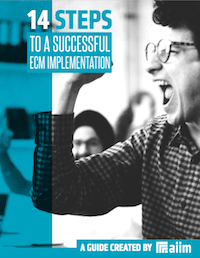The AIIM Blog
Keep your finger on the pulse of Intelligent Information Management with industry news, trends, and best practices.
Digital Transformation | Intelligent Information Management (IIM)
Like many other areas around the country and around the world, my daughter's school has joined the "learn from home" movement. I've been a teleworker for nearly 16 years, so we already have the technology infrastructure required, including an older but still useful laptop and fairly robust Wi-Fi. But it's come with more than a few challenges, some of which are the same types of information management challenges we all struggle with at times in the world of business. The back story: On March 16th, my daughter's school made the decision to have all the kids work from home for at least the next two weeks. At least one parent for each family had to go into the school that day to get set up on Google Classroom, have expectations set about attendance and performance, clean out lockers so they could be deep-cleaned, and pick up homework.
Share
I regularly get asked questions about AIIM and ARMA – which one’s “better,” which one’s the right one, what’s the difference, etc. I've been a dues paying member of both since 2001 – August 2001 for AIIM, September 2001 for ARMA. I've also served on both organizations’ Board of Directors (2004-2005 for AIIM, 2007-2010 for ARMA). I have thoughts on both and will compare them in several key areas, including: Focus Types of Membership Cost of Membership Benefits Chapters and Local Events Number of Members Before we get started, in the interest of total transparency, I serve as AIIM's VP of Training and Certification. With that in mind, our goal with this article is to be unbiased and provide those considering membership with the facts needed to make a decision.
Share

Making an ECM implementation successful requires planning and attention to detail. The best way to create the right solution is to identify organizational goals and priorities. Learn how to manage a successful implementation in our free guide.
Digital Transformation | Paperless Office
Many of us find ourselves working from home – often rather suddenly and unexpectedly. Organizations of all sizes and in all industries are now in the position of figuring out how to ensure that the business of the business continues while staff stay home and practice effective social distancing. The good news is that the technology needed for effective working from home exists and is generally mature – though some providers have found that the sudden surge in volume can cause issues with particular solutions or capabilities.
Share
Certified Information Professional (CIP)
It's no secret that I'm passionate about training and information management. I delivered the first AIIM public training course in the U.S. in January 2006. Since then, I've delivered more than 400 workshops, seminars, breakout sessions, and training courses relating to information management – almost all in person.
Share
Digital Transformation | Paperless Office
It seems like everyone is talking about coronavirus: what it means to the global and local economies, how it impacts different industries, even how to make your own hand sanitizer to combat it. One of the key approaches many organizations are taking is to minimize sustained contact with large groups of people. This has led to the cancellation of numerous conferences and other events; many schools and universities are asking students to stay home and participate remotely.
Share
This is perhaps one of the most-asked questions in all of records management. Too often I hear one of two, equally bad answers: Keep Records for Seven years: This seems to be the de facto answer, especially for financial services records. As near as I can tell, this comes from the U.S. Internal Revenue Service rules around when they can audit individual and corporate tax returns. If you've heard another original story for why we should keep all records for seven years, please share, and I'll update this post. Keep Records Forever: This generally is presented as one of four arguments: Just in case we get sued (or for some other legal reason) There's gold in them thar records! Analytics! AI! BIG DATA!!! Storage is cheap, figuring out what we can get rid of is not. Storage is cheap, penalties for getting rid of records inappropriately aren't.
Share